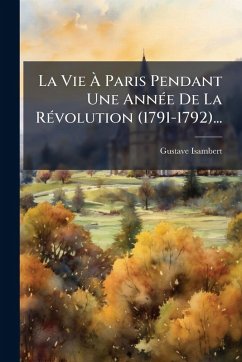
RÃ(c)flexions Sur La RÃ(c)volution De France Et Sur Les ProcÃ(c)dÃ(c)s De Certaines SociÃ(c)tÃ(c)s À Londres Relatifs À Cet ÉvÃ(c)nement En Forme D'une Lettre Qui Avoit DÃ' Être EnvoyÃ(c)e D'abord À Un Jeune Homme À Pari

PAYBACK Punkte
14 °P sammeln!
Réflexions Sur La Révolution De France is a renowned critique of the French Revolution by Edmund Burke. Written as a letter, this work dissects the events unfolding in France and examines the actions of societies in London related to the revolution. Burke offers profound insights into the upheaval, questioning the radical changes and their potential consequences. His analysis provides a cornerstone of conservative political thought, emphasizing tradition, order, and gradual reform. This edition makes Burke's seminal work accessible to readers interested in understanding the complexities of r...
Réflexions Sur La Révolution De France is a renowned critique of the French Revolution by Edmund Burke. Written as a letter, this work dissects the events unfolding in France and examines the actions of societies in London related to the revolution. Burke offers profound insights into the upheaval, questioning the radical changes and their potential consequences. His analysis provides a cornerstone of conservative political thought, emphasizing tradition, order, and gradual reform. This edition makes Burke's seminal work accessible to readers interested in understanding the complexities of revolution and the foundations of modern political philosophy. It remains a vital text for students of history, political science, and anyone seeking a deeper understanding of the forces that shape societies. This work has been selected by scholars as being culturally important, and is part of the knowledge base of civilization as we know it. This work was reproduced from the original artifact, and remains as true to the original work as possible. Therefore, you will see the original copyright references, library stamps (as most of these works have been housed in our most important libraries around the world), and other notations in the work. This work is in the public domain in the United States of America, and possibly other nations. Within the United States, you may freely copy and distribute this work, as no entity (individual or corporate) has a copyright on the body of the work. As a reproduction of a historical artifact, this work may contain missing or blurred pages, poor pictures, errant marks, etc. Scholars believe, and we concur, that this work is important enough to be preserved, reproduced, and made generally available to the public. We appreciate your support of the preservation process, and thank you for being an important part of keeping this knowledge alive and relevant.












